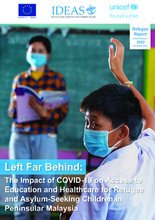Introduction and Background
As of end June 2022, there were 184,080 refugees and asylum-seekers registered with the United Nations High Commissioner for Refugees (UNHCR) in Malaysia including 47,200 children. The Klang Valley (comprising Selangor, Kuala Lumpur, and Putrajaya) hosts the highest number of ‘persons of concern’ to UNHCR (100,194 persons), followed by Penang (19,737 persons), Johor (16,045 persons), and Kedah (13,535 persons).
While Malaysia has a history of providing temporary asylum on humanitarian grounds to groups of asylum-seekers and refugees, the nation has yet to ratify the 1951 Refugee Convention and its 1967 Protocol. The Immigration Act 1959/63 makes no distinction between refugees, asylum-seekers, and undocumented migrants. Thus, the country lacks a legislative and administrative framework to protect refugees and asylum-seekers within its territory, resulting in their lack of access to basic rights such as freedom of movement, legal employment, formal education, and affordable healthcare. Malaysia is, however, party to several United Nations (UN) conventions, including the 1989 UN Convention on the Rights of the Child (UNCRC) and the 2006 UN Convention on the Rights of Persons with Disabilities (UNCRPD).
These conventions provide for State obligations to ensure refugee and asylum-seeking children, including those with disabilities, have, among other rights, the right to receive protection and humanitarian assistance, the right to education, and the right to healthcare. The UNCRC explicitly applies to all children in a country, not only of a country. Malaysia is also a party to the 1979 Convention on the Elimination of All Forms of Discrimination Against Women (CEDAW) and has obligations specifically related to the elimination of discrimination in access to healthcare and education for women and girls. In addition to this, Malaysia has also made several commitments on healthcare, education, and non-discrimination under the Sustainable Development Goals (SDGs) in a pledge to leave no one behind.
This thematic report is a merged and synthesised version of two full study reports, each focusing on education and healthcare. More details regarding the background, methodology, findings and recommendations of this project are found in the respective study reports.

